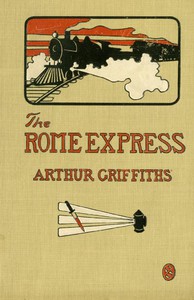The Passenger from Calais by Arthur Griffiths (i want to read a book .txt) 📗

- Author: Arthur Griffiths
Book online «The Passenger from Calais by Arthur Griffiths (i want to read a book .txt) 📗». Author Arthur Griffiths
ARTHUR GRIFFITHS The Passenger from Calais $1.25 The Rome Express 1.25
L.C. PAGE & COMPANY
New England Building, Boston, Mass.
The Passenger
from Calais By Arthur Griffiths Author of "The Rome Express," etc.
Boston L.C. Page and Company
Publishers
First Impression, January, 1906
Second Impression, February, 1906
Third Impression, February, 1906
Fourth Impression, March, 1908
Colonial Press
C.H. Simonds & Co.
Boston, U.S.A.
CHAPTER II.
CHAPTER III.
CHAPTER IV.
CHAPTER V.
CHAPTER VI.
CHAPTER VII.
CHAPTER VIII.
CHAPTER IX.
CHAPTER X.
CHAPTER XI.
CHAPTER XII.
CHAPTER XIII.
CHAPTER XIV.
CHAPTER XV.
CHAPTER XVI.
CHAPTER XVII.
CHAPTER XVIII.
CHAPTER XIX.
CHAPTER XX.
CHAPTER XXI.
CHAPTER XXII.
CHAPTER XXIII.
CHAPTER XXIV.
CHAPTER XXV.
CHAPTER XXVI.
CHAPTER XXVII.
CHAPTER XXVIII.
CHAPTER XXIX.
CHAPTER XXX.
FOREWORD
I desire to state that the initial
fact upon which I have founded
this story is within my own experience.
I travelled from Calais to
Basle by the Engadine Express in
the latter end of July, 1902, when
my wife and myself were the only
passengers. The rest is pure fiction.
A.G.
[9]
CHAPTER I. [Colonel Annesley's Story]The crossing from Dover to Calais had been rough; a drizzling rain fell all the time, and most of the passengers had remained below. Strange to say, they were few enough, as I saw on landing. It was a Sunday in late July, and there ought to have been a strong stream setting towards Central Europe. I hardly expected to find much room in the train; not that it mattered, for my place was booked through in the Lucerne sleeping-car of the Engadine express.
Room! When I reached the siding where this train de luxe was drawn up, I saw that I was not merely the first but the only passenger. Five sleeping-cars and a dining-car attached, with the full staff, attendants, chef, waiters—all lay there waiting for me, and me alone.
[10]
"Not very busy?" I said, with a laugh to the conductor.
"Parbleu," replied the man, polyglot and cosmopolitan, like most of his class, but a Frenchman, or, more likely from his accent, a Swiss. "I never saw the like before."
"I shall have a compartment to myself, then?"
"Monsieur may have the whole carriage if he wishes—the whole five carriages. It is but to arrange." His eyes glistened at the prospect of something special in this obvious scarcity of coming tips.
"The train will run, I hope? I am anxious to get on."
"But assuredly it will run. Even without monsieur it would run. The carriages are wanted at the other end for the return journey. Stay, what have we here?"
We stood talking together on the platform, and at some little distance from the railway station, the road to which was clear and open all the way, so that I could see a little party of four approaching us, and distinguish them. Two ladies, an official, probably one of the guards, and a porter laden with light luggage.
As they came up I discreetly withdrew to my [11] own compartment, the window of which was open, so that I could hear and see all that passed.
"Can we have places for Lucerne?" It was asked in an eager, anxious, but very sweet voice, and in excellent French.
"Places?" echoed the conductor. "Madame can have fifty."
"What did I tell madame?" put in the official who had escorted her.
"I don't want fifty," she replied, pettishly, crossly, "only two. A separate compartment for myself and maid; the child can come in with us."
Now for the first time I noticed that the maid was carrying a bundle in her arms, the nature of which was unmistakable. The way in which she swung it to and fro rhythmically was that of a nurse and child.
"If madame prefers, the maid and infant can be accommodated apart," suggested the obliging conductor.
But this did not please her. "No, no, no," she answered with much asperity. "I wish them to be with me. I have told you so already; did you not hear?"
"Parfaitement, as madame pleases. Only, [12] as the train is not full—very much the reverse indeed—only one other passenger, a gentleman—no more—"
The news affected her strangely, and in two very different ways. At first a look of satisfaction came into her face, but it was quickly succeeded by one of nervous apprehension, amounting to positive fear. She turned to talk to her maid in English, while the conductor busied himself in preparing the tickets.
"What are we to do, Philpotts?" This was said to the maid in English. "What if it should be—"
"Oh, no, never! We can't turn back. You must face it out now. There is nothing to be afraid of, not in that way. I saw him, the gentleman, as we came up. He's quite a gentleman, a good-looking military-looking man, not at all the other sort—you know the sort I mean."
Now while I accepted the compliment to myself, I was greatly mystified by the allusion to the "other sort of man."
"You think we can go on, that it's safe, even in this empty train? It would have been so different in a crowd. We should have passed unobserved among a lot of people."
"But then there would have been a lot of [13] people to observe us; some one, perhaps, who knew you, some one who might send word."
"I wish I knew who this passenger is. It would make me much easier in my mind. It might be possible perhaps to get him on our side if he is to go with us, at least to get him to help to take care of our treasure until I can hand it over. What a burden it is! It's terribly on my mind. I wonder how I could have done it. The mere thought makes me shiver. To turn thief! Me, a common thief!"
"Stealing is common enough, and it don't matter greatly, so long as you're not found out. And you did it so cleverly too; with such a nerve. Not a soul could have equalled you at the business. You might have been at it all your life," said the maid, with affectionate familiarity, that of a humble performer paying tribute to a great artist in crime.
She was a decent, respectable-looking body too, this confederate whom I concluded was masquerading as maid. The very opposite of the younger woman (about her more directly), a neatly dressed unassuming person, short and squat in figure, with a broad, plain, and, to the casual observer, honest face, slow in movement and of no doubt sluggish temperament, not [14] likely to be moved or distressed by conscience, neither at the doing or the memory of evil deeds.
Now the conductor came up and civilly bowed them towards their carriage, mine, which they entered at the other end as I left it making for the restaurant, not a little interested in what I had heard.
Who and what could these two people be with whom I was so strangely and unexpectedly thrown? The one was a lady, I could hardly be mistaken in that; it was proved in many ways, voice, air, aspect, all spoke of birth and breeding, however much she might have fallen away from or forfeited her high station.
She might have taken to devious practices, or been forced into them; whatever the cause of her present decadence she could not have been always the thief she now confessed herself. I had it from her own lips, she had acknowledged it with some show of remorse. There must surely have been some excuse for her, some overmastering temptation, some extreme pressure exercised irresistibly through her emotions, her affections, her fears.
What! this fair creature a thief? This beautiful woman, so richly endowed by nature, so [15] outwardly worthy of admiration, a despicable degraded character within? It was hard to credit it. As I still hesitated, puzzled and bewildered, still anxious to give her the benefit of the doubt, she came to the door of the buffet where I was now seated at lunch, and allowed me to survey her more curiously and more at leisure.
"A daughter of the gods, divinely tall and most divinely fair."
The height and slimness of her graceful figure enhanced by the tight-fitting tailor-made ulster that fell straight from collar to heel; her head well poised, a little thrown back with chin in the air, and a proud defiant look in her undeniably handsome face. Fine eyes of darkest blue, a well-chiseled nose with delicate, sensitive nostrils, a small mouth with firm closely compressed lips, a wealth of glossy chestnut hair, gathered into a knot under her tweed travelling cap.
As she faced me, looking straight at me, she conveyed the impression of a determined unyielding character, a woman who would do much, dare much, who would go her own road if so resolved, undismayed and undeterred by any difficulties that might beset her.
[16]
Then, to my surprise, although I might have expected it, she came and seated herself at a table close to my elbow. She had told her companion that she wanted to know more about me, that she would like to enlist me in her service, questionable though it might be, and here she was evidently about to make the attempt. It was a little barefaced, but I admit that I was amused by it, and not at all unwilling to measure swords with her. She was presumably an adventuress, clever, designing, desirous of turning me round her finger, but she was also a pretty woman.
"I beg your pardon," she began almost at once in English, when the waiter had brought her a plate of soup, and she was toying with the first spoonful, speaking in a low constrained, almost sullen voice, as though it cost her much to break through the convenances in thus addressing a stranger.
"You will think it strange of me," she went on, "but I am rather awkwardly situated, in fact in a position of difficulty, even of danger, and I venture to appeal to you as a countryman, an English officer."
"How do you know that?" I asked, quickly concluding that my light baggage had been [17] subjected to scrutiny, and wondering what subterfuge she would adopt to explain it.
"It is easy to see that. Gentlemen of your cloth are as easily recognizable as if your names were printed on your back."
"And as they are generally upon our travelling belongings." I looked at her steadily with a light laugh, and a crimson flush came on her face. However hardened a character, she had preserved the faculty of blushing readily and deeply, the natural adjunct of a cream-like complexion.
"Let me introduce myself in full," I said, pitying her obvious confusion; and I handed her my card, which she took with a shamefaced air, rather foreign to her general demeanour.
"Lieut.-Colonel Basil Annesley, Mars and Neptune Club," she read aloud. "What was your regiment?"
"The Princess Ulrica Rifles, but I left it on promotion. I am unattached for the moment, and waiting for reëmployment."
"Your own master then?"
"Practically, until I am called upon to serve. I hope to get a staff appointment. Meanwhile I am loafing about Europe."
"Do you go beyond Lucerne?"
[18]
"Across the St. Gothard certainly, and as far as Como, perhaps beyond. And you? Am I right in supposing we are to be fellow travellers by the Engadine express?" I went on by





Comments (0)